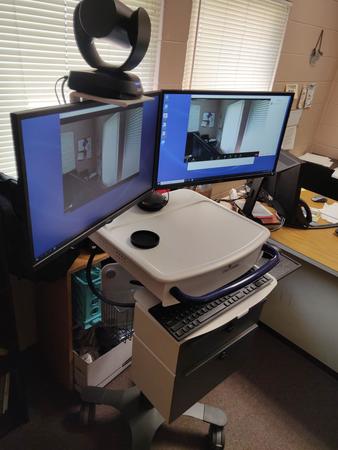Nov. 18, 2020: Colorado county jails are turning to telebehavioral health services during the COVID-19 pandemic and uncovering surprising benefits, thanks to a funding boost from the Colorado Department of Human Services, Office of Behavioral Health (OBH).
OBH recently doled out nearly $547,000 among 28 county jails to build “telehealth kiosks” outfitted with tablets, video-conferencing software and additional equipment. The jails participate in the state’s Jail-Based Behavioral Health Services (JBBS) program, which supports jails in providing in-house mental health and substance use disorder treatment. The goal is to reduce sentence lengths and recidivism rates by addressing the behavioral health needs of incarcerated people.
As jails restrict outside visitors, telehealth has been a lifeline for JBBS participants, county jail officials say. Using the kiosks, those in jail can continue to meet with clinicians, attend therapy sessions and connect with loved ones online.
“COVID-19, as tragic and unfortunate as it is, has shown that the world continues to operate from the safety and security of our jail,” said Captain Michael Yowell with the Lincoln County Jail. “I truly hope that some of this digital technology sticks around for the long haul, because it has been a game-changer for us.”
Yowell said the technology allows offenders to keep up with medical and court visits without traveling hundreds of miles, a benefit that has saved the Eastern Plains jail tens of thousands of dollars. The jail also recently expanded their clinical team and hired a mental health nurse practitioner who is available 16 hours each week.
“Not only can [the nurse practitioner] come in and see the inmates, she can prescribe medications on the fly, get them ordered, and we’ll have them here the next day,” Yowell explained. “On top of that, we’ve expanded our therapy sessions to 12 hours a week, and we’re doing those over telehealth right now. We’re doing group, we’re doing individual, we’re doing consults between the nurse practitioner and the therapist so we have better care coordination.”
Yowell added that telehealth makes it easier for deputies and clinicians to collaborate, an unexpected positive noted by other county jails.
Chelsea Dize, a JBBS clinician with Clear Creek County Jail, said her team and jail administrators have worked closely throughout the pandemic to maintain services.
"Something I'm just so proud of in our jail is it’s not shameful to go to psych and to ask for mental health treatment in our jail," Dize said. "It’s very common and accepted."
Timothy Oliveira, support services commander at the Boulder County Jail, has also noticed a culture shift at his facility due to the pandemic. He said that staff have not only creatively leveraged technology to connect individuals to services, but are also getting to know the inmates on a deeper level.
"We saw a sense of enlightened compassion from line staff to the inmate population, as they've started to see them as people with lives outside of this place. I think it's broken down barriers," Oliveira said. "Although it was challenging on the front end, it was almost a call to reunite and reassess what we’ve been doing for years and how we engage our population differently."
It’s this people-first approach that is helping Lincoln County find success, too, Yowell said. He began throwing pizza parties that bring together deputies, jail staff and offenders participating in JBBS services. It’s a way to build trust, motivate offenders to stick with their treatment, and—ideally—change their life trajectory.
“I couldn’t be more excited about what lies ahead for both our community and Sheriff’s Office,” Yowell said. “By default, we have a prime opportunity to have [offenders] sober and independent to make a conscious decision about their recovery, and we’re starting to see the dividends of that right now.”
The 28 county jails awarded telehealth funds are Alamosa, Bent, Chaffee, Clear Creek, Crowley, Custer, Delta, Elbert, Fremont, Garfield, Grand, Gunnison, Kit Carson, Las Animas, La Plata, Lincoln, Montrose, Otero, Park, Pitkin, Prowers, Rio Blanco, Rio Grande, Routt, Summit, Teller, Washington and Yuma counties. OBH selected the jails based on their interest level in implementing telehealth services.
For more information on the JBBS program, visit the OBH website.
